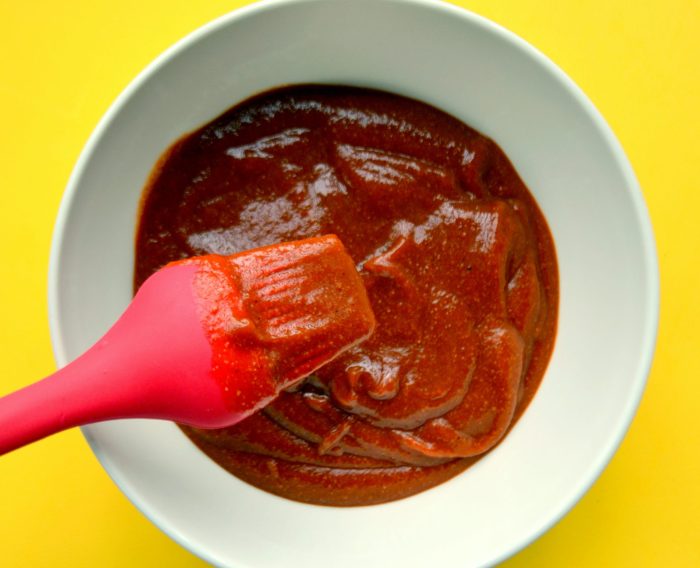Barbecue Sauce Recipe Tomato Paste Essential
Tomato Paste: The Unsung Hero of Barbecue Sauce
Barbecue sauce recipe tomato paste – Tomato paste, often overlooked, plays a pivotal role in elevating barbecue sauce from good to exceptional. Its concentrated flavor, rich texture, and ability to deepen color make it an indispensable ingredient. This article delves into the multifaceted contributions of tomato paste to barbecue sauce, exploring its various applications, flavor enhancements, and visual impact.
The Role of Tomato Paste in Barbecue Sauce
Tomato paste acts as a foundational element, providing a robust base flavor and contributing significantly to the sauce’s overall texture and consistency. Its concentrated tomato essence delivers umami depth, balancing sweetness and acidity. The paste’s thickening properties help achieve the desired viscosity, preventing a watery or overly thin sauce.
Types of Tomato Paste and Their Impact
Several types of tomato paste exist, each impacting the final product differently. Standard tomato paste offers a classic, well-rounded flavor. Fire-roasted tomato paste adds a smoky complexity, while sun-dried tomato paste introduces a more intense, concentrated taste with a slightly sweet edge. The choice of paste influences the overall flavor profile of the barbecue sauce.
Barbecue Sauce Recipes Utilizing Tomato Paste

Source: thespruceeats.com
The versatility of tomato paste allows for a wide range of flavor profiles. Below are three distinct recipes showcasing this adaptability.
| Recipe Name | Ingredients | Instructions | Notes |
|---|---|---|---|
| Classic Tomato BBQ Sauce | 1 (28 ounce) can crushed tomatoes, 1 (6 ounce) can tomato paste, 1 cup apple cider vinegar, ½ cup brown sugar, 2 tablespoons Worcestershire sauce, 1 tablespoon smoked paprika, 1 teaspoon garlic powder, 1 teaspoon onion powder, ½ teaspoon black pepper, ½ teaspoon cayenne pepper (optional) | Combine all ingredients in a saucepan. Bring to a simmer, then reduce heat and cook for at least 1 hour, stirring occasionally, until thickened. | Adjust sweetness and spice to taste. |
| Smoky Chipotle BBQ Sauce | 1 (6 ounce) can tomato paste, ½ cup chipotle peppers in adobo sauce, ½ cup apple cider vinegar, ¼ cup brown sugar, 2 tablespoons liquid smoke, 1 tablespoon Worcestershire sauce, 1 teaspoon cumin, 1 teaspoon garlic powder, ½ teaspoon oregano | Blend chipotle peppers with adobo sauce until smooth. Combine with remaining ingredients in a saucepan. Simmer for 45 minutes to an hour, stirring occasionally, until desired consistency is reached. | Use caution with chipotle peppers; adjust quantity based on desired heat level. |
| Sweet and Tangy BBQ Sauce | 1 (6 ounce) can tomato paste, 1 cup white wine vinegar, ¾ cup honey, ¼ cup brown sugar, 2 tablespoons Dijon mustard, 1 tablespoon soy sauce, 1 teaspoon ground ginger, ½ teaspoon ground cloves | Combine all ingredients in a saucepan. Bring to a simmer, reduce heat, and cook for 30-45 minutes, stirring occasionally, until thickened. | This sauce is excellent for ribs or chicken. |
Exploring Flavor Profiles with Tomato Paste
The interplay between tomato paste and various spices and vinegars creates a diverse range of flavor profiles. The choice of vinegar significantly impacts the overall acidity and brightness of the sauce. Apple cider vinegar lends a subtle sweetness, while white wine vinegar offers a sharper, more acidic note. Spices such as smoked paprika, chipotle powder, cumin, and garlic powder add depth and complexity, complementing the tomato paste’s rich base.
Techniques for Enhancing Tomato Paste Flavor
Caramelizing tomato paste before incorporating it into the sauce intensifies its flavor and color. This process involves slowly cooking the paste over low heat, stirring frequently, until it darkens and becomes slightly sweet. To prevent clumping, whisk the tomato paste with a small amount of liquid (water, vinegar, or broth) before adding it to the other ingredients. For a perfectly smooth sauce, use an immersion blender or strain the sauce through a fine-mesh sieve after cooking.
Visual Representation of Barbecue Sauce
A well-made tomato paste-based barbecue sauce exhibits a deep, rich color, ranging from a reddish-brown to a deep mahogany, depending on the ingredients used. Its texture should be smooth and glossy, with a viscosity that coats the back of a spoon. The aroma should be complex and inviting, combining the sweetness of the tomatoes and sugar with the smoky notes of spices and the tang of vinegar.
As the sauce simmers and reduces, the color deepens, becoming more concentrated and lustrous, while the viscosity increases noticeably.
Many barbecue sauce recipes rely on tomato paste for that rich, tangy base. However, if you’re aiming for a brighter, fresher flavor profile, consider the subtle differences. For a lighter, more vibrant tomato taste, you might find inspiration in an authentic Italian marinara sauce recipe using fresh tomatoes, such as this one: authentic italian marinara sauce recipe fresh tomatoes.
Understanding the nuances of different tomato-based sauces can significantly enhance your barbecue sauce recipe tomato paste creations.
Storage and Shelf Life, Barbecue sauce recipe tomato paste

Source: memphisgrills.com
Store homemade barbecue sauce in airtight containers in the refrigerator for up to 2 weeks. For longer storage, freeze the sauce in ice cube trays or freezer-safe containers for up to 3 months. Signs of spoilage include mold growth, off-odors, or significant changes in texture or color.
Helpful Answers: Barbecue Sauce Recipe Tomato Paste
Can I substitute other types of paste for tomato paste?
While tomato paste is ideal, you could experiment with other concentrated pastes like sun-dried tomato paste for a more intense flavor, but the results will differ significantly.
How long can I store leftover barbecue sauce?
Refrigerated homemade barbecue sauce generally lasts for 3-5 days. Freezing extends the shelf life to several months.
What if my sauce is too thick or too thin?
Adjust consistency by adding water (thin) or simmering longer to reduce (thicken).
Can I use canned diced tomatoes instead of tomato paste?
No, canned diced tomatoes lack the concentrated flavor and texture tomato paste provides. You could reduce diced tomatoes to a paste-like consistency, but the taste will be different.




















